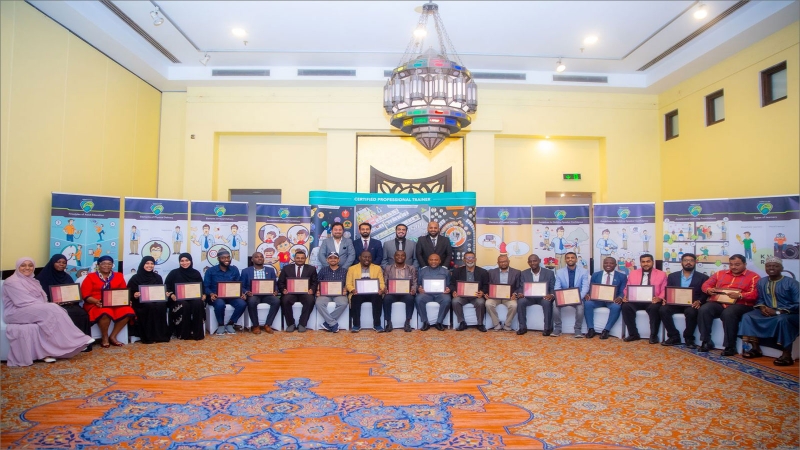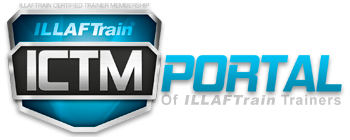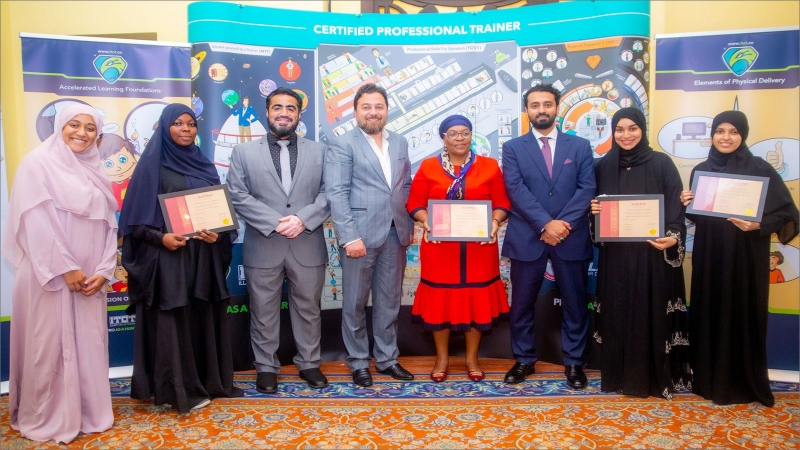Tanzania - Dar Es Salaam: ILLAFTrain concludes the Certified Professional Trainer (CPT) diploma course

| Group photo at the end of the course |
Dar es Salaam, Tanzania - 2023-02-17
For at least 100 hours, an elite group of trainees who were eager to learn and passionate about discovering new techniques of teaching and learning gathered in one training room.
The CPT Diploma training program was held by ILLAFTrain in Dar Es Salaam, Tanzania, from November 14–26, 2022, at the Serena Hotel - renowned for its history and heritage in the city.
This training event was led by Dr. Mohammad Pedra, a Certified Consultant Trainer; Mr. Majed Bin Afif, an Expert Trainer from the United Arab Emirates; and Mr. Hussain Habib Alsayyed, an Expert Trainer from Qatar.
A distinguished group of trainees interested in learning new information and skills in the field of TOT attended the course. These trainees' enthusiasm and passion for learning made for an engaging interaction. At the conclusion of the daily training session, the trainees were so engrossed that they did not want to leave the classroom. They were committed to success until late each night because they had faith in the high quality of the knowledge they had gained and the status they expected to achieve once the program was over.
These trainees have challenged the program's trainers to adopt a novel approach by using exercises that are both intensive and practical until the trainees reach the highest level of proficiency. The goal is for the trainees to advance to a point where they can lead the business and advance on the training platform, depending on where they are in their careers.
Throughout the course, there were numerous goals and themes covered:
First: Train of Trainers (TOT):
"What the trainee thinks, says, and does is more important than what the trainer thinks, says, or does."
The course's participants learned about the steps of the training process, its methodology—which places the trainee first and foremost, not the trainer—and how the trainer offers a wealth of activities and exercises that enrich the educational process and increase its impact on the trainees. It also concentrated on how the trainer can inspire the trainee with confidence and inspire them to actively participate in the educational process by asking questions and indulging in all their emotions.
In order to meet the needs of the trainees and ensure their full inclusion in the educational process, the trainees also learned how to create the ideal learning environment based on collaboration rather than competition.
Second: Professional Skills for Speakers (TOS):
"The word is the passport to the world."
Here the focus was on teaching the trainees a set of fundamental abilities related to boosting speaker confidence, speech principles, verbal and nonverbal communication principles, and the elements of vocal speech. In this course, the trainees were also taught methods for enhancing the trainer's voice's impact, including how to make the most of the speed of the voice, when to pause, and where to adjust the tone of the voice, whether it be higher or lower. In addition to crucial tips on visual communication, this course covered techniques to enhance body skills in speech and the use of gestures to support the message. It also covered numerous skills that turn the language into a passport that enables the trainer to go wherever he wants with their trainees.
Third: Learning Theories (LT):
"Creating educational materials that are appropriate for all trainees."
Anyone who aspires to work as a professional trainer will find this course to be full of useful information. Adult learning principles, the stages of the educational process, Accelerated Learning foundations, and how to write a training objective are all covered in this course. Participants will also learn how to attract learners' attention using McClelland's theory, and how to deliver feedback to learners. In addition to important guidance in providing summaries and reviews.
Fourth: Market Yourself as a Trainer (MYT):
"The size of the goal the trainer sets for themself is the only limitation on the outset."
The course trainers discussed how they can grow their training by first developing a vision and mission as consultants, translating those into ongoing goals and tasks to be completed, and setting up their time and businesses in accordance with their training priorities and objectives. All of this is aimed at giving trainers more training and training material experience so they can promote themselves based on their objectives and geographic reach. This course also covered how to draft contracts and agreements, calculate training costs, and interact with training providers and seekers of all kinds.
Dr. Mohammad, Mr. Majed, and Mr. Hussain, the course trainers, were eager to stray from conventional teaching techniques and employ new approaches to breaking down expectations and communicating information. The use of accelerated learning techniques and applications has also significantly increased the participants' acceptance of the volume of information provided during the course, as evidenced by their training presentations, which were evolving day by day and surprised everyone in the course's final days.
Daily tours and trainee presentations:
"The trainee only picks up what they have applied and repeated,"
As each trainee was required to give a training presentation as a trainer and to stand before the trainees at the end of each training day beginning on the first day, the training days were marked by a high level of interaction and enthusiasm. The trainees' application of the knowledge and skills they learned during the training event is what makes these presentations so appealing in terms of the degree of their day-by-day visible progress.
The participants surpassed expectations with their abilities. They presented their work in depth on the final day. They prepared training materials, spoke vocally and physically, engaged the audience with enthusiasm during their presentations, used a variety of teaching techniques, and avoided using conventional teaching methods, all of which demonstrated their proficiency. Simply put, they provided presentations that could only have been by true experts in the field of training.
The closing day of the course:
“The real certificate of the participants is to be in the hearts and minds of their future trainees.”
The consultant trainer, Dr. Mohammad, created the post-program action plan on the final day of this significant event and gave the trainees many guidelines and instructions. In order to instill the scientific and practical material and further their acquired skills, he concentrated on having the trainees put what they had learned and acquired during the course into practice. Public discussions and research were also conducted on how to improve and carry out each group's plans. All attendees' opinions and questions were also discussed.
In their final remarks to the trainees, Mr. Majed and Mr. Hussain thanked them and urged them to keep learning and growing to achieve the highest levels of professionalism in training. In response, the trainees thanked the trainers and the ILLAFTrain Tanzania team for putting on such a high-quality and distinctive event and assured everyone that there are now professional working in Tanzania's training sector, bringing about advancement and a renaissance in the field of human development in general and the training sector in particular.
The trainees sang African chants to express their accomplishment and completion of this event, which lasted for twelve days, and shared their thoughts on the program one by one at the conclusion of this celebration, which was captured on audio and video. The atmosphere at the conclusion was one of joy, happiness, accomplishment, and learning above all else. The event was then brought to a close with the taking of group photos of the trainees and the trainers as well as a series of commemoration photos to capture the joy they shared during the course days.



